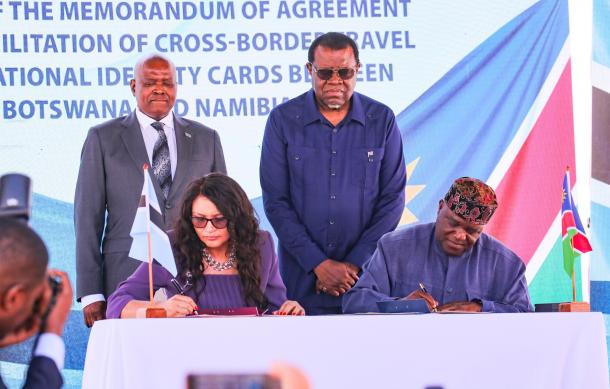
The governments of Namibia and Botswana will jointly ensure that robust information technology systems and infrastructure are put in place to improve border management and allow the two countries' national systems to function seamlessly with one another.
This follows the signing of the Memorandum of Agreement, which paves the way for the use of national ID cards in travel between citizens of the two countries, on Friday.
Presidents Hage Geingob and Mokgweetsi Masisi hailed the agreement as a game changer in their bilateral relations.
Identity cards will be used for travel at four of the five entry and exit ports between Namibia and Botswana.
These are the Trans-Kalahari/Mamuno border post, as well as the Ngoma, Mohembo, and Kasane Immigration offices.
The exception is Dobe Border Post, which is undergoing infrastructure developments on the Botswana side.
A Joint Committee, comprising technical officials from Namibia and Botswana, is tasked with developing the required architecture for data capture, data storage, and identification of travelers.
The agreement is the first of its kind in the SADC region, said Geinngob, adding that "we are taking the first steps toward the realization of the SADC Protocol on the Facilitation of Movements of Persons. In the same vein, steps like this could form the foundation whose stepping stones may lead the path to inspire Africans to attain continental integration and thereby realizing the promise to galvanize and unite in action all Africans and the Diaspora around the common vision of a peaceful, integrated, and prosperous Africa, as espoused in our Agenda 2063."
In 2021, Namibia upgraded the features of its national IDs in line with the requirements of the International Civil Aviation Organization.
The new IDs with machine-readable zones feature what is known as the "Quick Response Code," or QR Code, rather than fingerprints.
Namibians would be required to use these new IDs for travel to Botswana, while their Botswana counterparts are yet to follow with a similar security feature upgrade.
"To the citizens of our two countries, the use of identity cards as travel documents is being put in place for the convenience of our citizens. Please cooperate with the officials managing migration to ensure the success of this project. It is your project, and its success depends on how you conduct yourselves."
The use of IDs for travel is just one of the ways in which the two countries intend to harness the benefits of advanced technologies offered by the 4th Industrial Revolution to modernize their information technology systems.
In terms of the agreement, nationals of either country holding valid ID cards may enter the other side and stay for a period not exceeding 30 days at any given time.
If planning to stay for a period longer than thirty (30) days, that national shall be required to use a valid passport and any other documentation that may be required, in compliance with the national laws of both countries.





